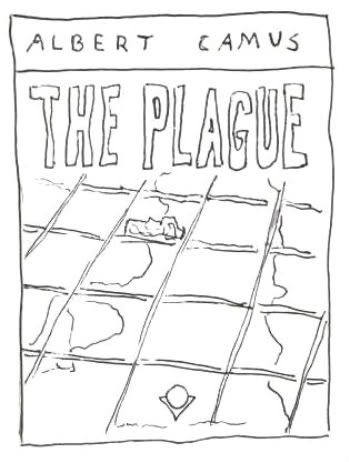When I was a young Christian, I tended to criticize existentialist writers like Albert Camus, because they believed in an indifferent universe, yet managed to create startlingly sensitive and compassionate characters within that framework. What, I wondered, would motivate people to sympathy and compassion if they rejected spiritual absolutes like God? Now, I think, I have an answer: The intrinsic value of humanity.
When a man is stripped of all points of reference except himself and the world that surrounds him, he is forced to create meaning as a kind of defense mechanism. The alternative (a total lack of meaning) would lead to fear and paralysis. Yet the characters of Camus do find meaning. Take the doctor Rieux, from The Plague. He doesn’t believe in anything outside the realm of human experience. His life, as a doctor, is to heal others, and prolong their lives. Thus, though he believes in no absolutes, he is justified in weeping when a child dies, because Rieux has made keeping people alive the crux of his existence, his meaning. In this sense, Rieux is a lover of humanity, and his compassion is real.
One could easily condemn Rieux for leading a life that contradicts itself. That is, he believes everything is ultimately meaningless, yet he places so much value on human life. He could, justifiably, let the plague killl everyone, and the universe would be no worse for wear. But he does not. He chooses to rage and rage and weep at the reality of death and the loss of a beautiful and temporal existence. Perhaps this is what Camus got that Christians tend to miss: human life is valuable because it is fragile and weak and uncertain and doomed to death. If human life continued forever, what would be the motivation to love, to cry, to rage? Out of the transient, Camus found beauty and meaning.
This idea is very like Dietrich Bonhoeffer’s idea of “this-worldliness,” from his Letters and Papers from Prison. We find ourselves in a precarious state of existence. Death can come at any moment and, in the meantime, we are left in a world that is real and vibrant and so full of life that it is bursting, boiling over, charged with grandeur. What are we to do? Live and love. And meaning will find us somehow in the process.
The emphasis is taken off the intricacies of doctrine and placed instead upon the value of life and a world that is so bright and full of energy that all we can do is shield our eyes and weep. And once we get used to the brightness, we are finally free to be alive and to become lovers of humanity. On this level, I believe, Camus was right. The term “lovers of humanity” might set off warning bells in the mind of the conservative Christian, who believes humanity to be utterly depraved, “deceitful and desperately wicked.”
I am not denying the existence of evil in humans. I am merely suggesting a different kind of love. A love that does not say, “I love you not because I love you, but because I love God.” I love God. But must our love for actual people be so condescending and selfish that we are loving them to somehow win God’s favor? I think we ought to love because it is our most excellent human faculty. We love people, for their sake. Rieux the doctor devoted his whole existence to it. I fear we lose a great deal if we do not, at least in some sense, learn from that example.
Whether we believe our faculty for loving is a God-given gift or an intrinsic part of being human, the fact remains that there is something welling up inside us, longing to love and be loved. Our beliefs do not change our ability to love. An atheist/existentialist like Camus may in fact have more love for his fellow man than his Christian counterpart. He loves not out of fear of punishment or reward, but because love is a good in itself. He loves because he knows what it like to be loved.
Loving people is one of the most beautiful and transcendent and worthwhile ventures that a person can undertake. I don’t claim to understand love, and I’m not even sure that Camus’ motivations are “correct.” But I do know that I’ve seen non-Christian adults demonstrating a very real capacity for genuine love. Love, or the possibility of love, is present in everyone. The older I get, the more I come to think that love is perhaps the best avenue to God, even if we have intellectually rejected the existence of God. In The Brothers Karamazov, a woman tells the old Father Zossima that she no longer believes in God, that she has lost all certainty. Zossima replies that certainty is impossible, but conviction is possible, through active love.

